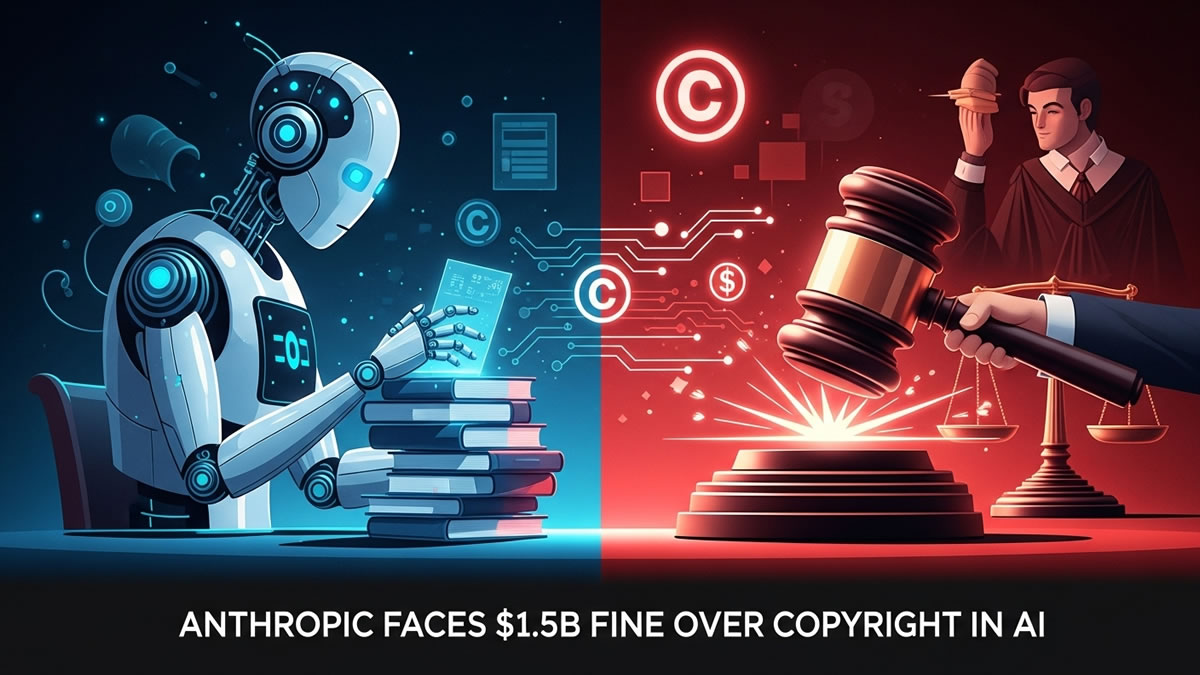What occurs when creativity collides with the restrictions of legislation? The recent $1.5 billion resolution involving Anthropic, a prominent AI builder, is a sharp warning that even the most advanced systems are not resistant to the weight of judicial and ethical evaluation.
This case, focused on the usage of stolen books to instruct AI frameworks, has spread tremors through the technology sector, compelling organizations to confront the mounting dangers of unauthorized dataset utilization.
Stay up to date with the latest technology in TheTechCrunch, which covers artificial intelligence, mobile and web apps, modern things, cyber security, and general technical news. From AI’s successes to chat and generative tools, such as smartphones, laptops, and wearables’ special reviews, TheTechCrunch gives an insight into this case.
With financial charges of this scale, the resolution is greater than just a legal conclusion; it is an alarm for an industry that frequently operated within uncertain corners of copyright rules. The stakes are higher than earlier, and the outcomes of disregarding property rights are impossible to ignore.
Understanding the Ripple Effect of Settlement
This analysis delivers deeper knowledge into the extensive implications of Anthropic’s agreement, presenting clarity into how it might transform the trajectory of artificial cognition. From narrowing definitions of fair usage to the increasing expenses of compliance, the situation signals a profound alteration in how AI organizations manage dataset collection and authorization.
But this is not merely a tale concerning courtroom conflicts; it represents the transforming bond between invention and responsibility. As you continue reading, you will uncover how this historic ruling might redefine the competitive landscape of AI, challenge emerging ventures, and unlock fresh chances for creators within the digital marketplace. The insights here are not exclusive to major companies but are for anyone navigating ownership in an evolving environment.
Shaping Compliance Through Legal Decisions
At the center of the judicial conflict was Anthropic’s reliance on stolen texts, gathered from repositories like Library Genesis, to prepare its AI structures. The tribunal judged firmly that such behavior does not belong under the principle of permissible usage, a legal defense often invoked by AI engineers to rationalize their exploitation of copyrighted material.
The determination confirmed that employing protected works without clearance for business goals, even when the created AI systems are impressive, constitutes a breach of intellectual ownership statutes. This outcome carries substantial consequences for the AI community. It undermines the common dependence on unlicensed or shadow-market datasets, reinforcing the necessity for firms to prioritize compliance.
The decision issues a strong message: the use of safeguarded material without clear authorization shall not be permitted, and enterprises participating in these habits expose themselves to harsh judicial and financial outcomes.
The matter also reignites discussion about the boundaries of permissible usage within AI progress. Whereas permissible usage had long been uncertain, this conclusion narrows its scope, particularly for business adoption. Developers must navigate stricter rules, balancing novelty with duties to honour creators’ ownership.
Financial Burdens and Continuing Risks
The $1.5 billion resolution establishes heavy monetary demands upon Anthropic. The corporation is compelled to deliver an initial instalment of $300 million, with the remaining $1.2 billion spread across two years, gaining interest.
Furthermore, the arrangement contains a conditional punishment: should the number of pirated materials used during training surpass 500,000, Anthropic must remit $3,000 for each additional piece. As required by the agreement, Anthropic must destroy every stolen dataset employed within its AI training. Nevertheless, the firm may preserve its operational systems, guaranteeing continuity.
This compromise enables Anthropic to maintain competitiveness while addressing earlier infringements. Importantly, the settlement concludes only claims tied to past violations, leaving the organization vulnerable to additional lawsuits regarding derivative outputs or continuing conflicts.
The weight of this financial penalty is predicted to influence across the AI ecosystem. It underlines the immense costs associated with disregarding ownership restrictions and acts as a lesson for other players. The case stresses the importance of instituting solid compliance infrastructures to reduce exposure and prevent analogous liabilities.
Setting Industry-Wide Precedents
This dispute produces a decisive judicial standard for AI, reflecting a shift toward tighter application of copyright statutes. It imposes greater accountability upon AI designers to guarantee their datasets are lawful and authorized. The judgment also raises pressing concerns about boundaries of permissible use in development, urging organizations toward more transparent and ethical conduct.
For the greater AI sector, the resolution functions as a resounding caution. It highlights the earnestness of accepting compliance approaches and illustrates the meaning of sourcing genuine data. Companies abandoning to conform risk monetary loss and lasting reputational damage, which can impede consistency and hinder development.
Smaller firms dependent on free sources may struggle as compliance costs climb, while established organizations will invest extensively in adherence, widening the competitive divide.
Rising Prices and Licensing Opportunities
The aftershocks from this settlement are projected to raise expenditures on AI innovation substantially. As enterprises abandon stolen or unlawful datasets, the appetite for licensed information will surge. This evolution could escalate the costs of content from publishers, platforms, and community-driven repositories such as Reddit or Twitter.
For lean start-ups, these elevated costs might generate difficult barriers, restricting their capacity to rival stronger corporations. Larger incumbents must dedicate resources toward thorough contracts and compliance frameworks to minimize threats. These dynamics are anticipated to reshape competition, benefiting those equipped to manoeuvre responsibly.
Meanwhile, demand for authorized data provides fresh avenues for writers and distributors. As AI organizations chase reliable information, the worth of validated content will expand, reflecting the growing significance of ownership within the digital economy.
Investor Confidence and Strategic Shifts
The Anthropic case bears notable effects for financiers engaged in artificial intelligence. Legal and functional risks have grown more visible, rendering thorough evaluations of data practices a vital element in deciding investments. Backers must now calculate potential expenditures linked to compliance, settlements, and brand harm before supporting AI ventures.
This ruling illustrates the necessity of lawful practices not merely for regulation but for retaining investor faith. Enterprises tackling these challenges directly are more likely to attract backing and sustain advancement. Conversely, those ignoring these imperatives may lose access to funding and endure heavier monitoring from regulators.
A Turning Point for Content Value
The sharper oversight of data management is fueling a redefinition of intellectual property. Publishers and distribution channels will profit from mounting demand for licensed resources, as developers seek legitimacy. Platforms built on user contributions may equally benefit since their information becomes increasingly valuable for machine instruction.
Explore a complete hub for the latest apps, smart things, and security updates online, ranging from AI-operated solutions and automation tools. TheTechCrunch offers intensive articles, comparisons, and specialist analysis designed to understand the rapidly changing technology. Whether you are keen on robotics, data protection, or the latest digital trends.
This marks the growing relevance of data stewardship within digital commerce. As AI grows, the capacity to supply verified, licensed material will serve as a significant differentiator. Moving toward ethical sourcing is both a protective requirement and a strategic opening for creators to leverage mounting demand.
The $1.5 billion agreement between Anthropic and rights holders stands as a watershed for AI. It emphasizes risks tied to misusing data and forms a precedent for compliance with intellectual property. As industries adapt, enterprises must commit to lawful conduct, invest in trustworthy resources, and prepare for cost escalation.
For investors, content providers, and AI developers, the episode offers a critical reminder of complexities within a shifting marketplace. The lessons drawn from this settlement will guide AI’s future, fostering invention while protecting ownership.






